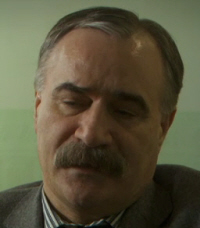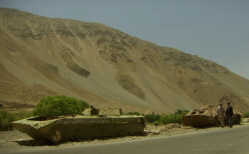Great Climb-Down
Russia Exits Stage Left
Vladimir Vyatkin
In a Moscow library, I met with Vladimir Vyatkin, a state photographer sent to Afghanistan in the 1980s.
Vladimir Vyatkin “This is the reality from one hand. I was obliged to shoot this material. Where we with our Afghan brothers, we came
with the humanitarian mission. To build hospitals, schools, to teach, to educate but 20 km from that place Soviet paratroopers were
shooting Afghans.”
When he began to take photographs and ask questions about the war, he was sent home and banned from further travel. How much was he able
to see of Kabul?
Vladimir Vyatkin “We were allowed to take pictures in the University, the hospital, the bookstore. But behind our backs there was a war
going on. When I flew then I saw the ranks of coffins. I asked this sentry, ‘Were those boxes of arms?’ And he answered ‘That is meat that
no-one needs any more. Material that has run its course.’.”
Memories
As the Soviets tried to maintain the illusion that Afghanistan was a largely peaceful mission, dead bodies were returned to Russia,
sealed in unopenable zinc coffins and delivered to their families at night.
Finally, Mikhail Gorbachev, who became General Secretary in 1985, made the decision to withdraw. It was the right decision and the
courageous one. But he had many interests to manage, not least the military, who are demanding more time and more resources. So the
deadline was set three years out for 1988.

Ruslan Aushev

Russian Tank Debris
The parallels between Gorbachev and Obama are really striking. In both cases the common, they accept that it’s not going well. In both
cases they do a mini-surge, they say to the military, ‘We’re going to give you a little more time and more troops, we’re going to try
harder.’ And Gorbachev, the amount of expenditure on Afghanistan in fact goes up, but at the same time they are setting a deadline, and
the deadline that completely erodes their authority. So between these two impossibilities, the impossibility of winning and the impossibility
of acknowledging that you can’t win, on the tragedy of Obama and Gorbachev emerges.
Ruslan Aushev “Well you know this history. We didn’t read books properly, your coalition forces forgot past experience. Afghans don’t
like people who come with arms, they don’t like Armed Forces who come and say ‘You need to live this way’. You’re directly following in
our footsteps.we did the same thing, we went there and we could clear any area without any problem. Then roughly a week or month after
we left the Mujahideen would come back and the whole thing would fall apart. Because more forces were needed, your coalition would need
to send half a million more men, and how much would that cost?”
If you were going to pass a message to the American and British troops today, what would you say to them?
Ruslan Aushev “take the quickest route home!”
Russian Grave
But the route out of Afghanistan is never quick or straight. Although it was now clear that Russia was withdrawing, it was still be
years before the final soldier left. And whilst the bloodletting continued, no-one really believed in the project any more. Half as many
soldiers died again following the decision to withdraw.
By the time they leave, there’s nobody there to greet them. Nobody from the Department of Defence, nobody from the Politburo, nobody
from the party. They’ve sacrificed 25,000 lives for the ideal of the Soviet Union and not a single person pays them the courtesy of
meeting them at the border.
The Afghan war may not have brought down the Soviet Empire, but the war had dealt it a major blow, both financially and to its
prestige. And the Politburo was embarrassed even now the sacrifice of its soldiers.
This is the great monument to the Soviet soldiers of the Second World War. for generations now, Soviet soldiers have come to this
flame to remember their sacrifice and their victory. But the Afghansti, the Soviet soldiers from Afghanistan, returned to a different
world. He came from almost shameful, secret war, and the million who returned many of them psychologically damaged, returned to the
Soviet Union that was itself collapsing.
Now, 12 years later, veterans of Afghanistan still meet in places like this, Moscow’s Kombat Bar

